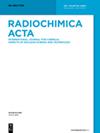HR GRS-HPGe as NDT method for quantification of uranium and U235 content in process stream samples from UO2 fuel production facilities
IF 1.7
3区 化学
Q4 CHEMISTRY, INORGANIC & NUCLEAR
引用次数: 0
Abstract
Uranium concentration and uranium isotopic content are two important and critical parameters for any nuclear fuel fabrication facilities. In the present study emphasis has been given on the usage of high resolution gamma ray spectrometric (HR-GRS) technique with HPGe detector for the determination of uranium andHR GRS-HPGe 作为无损检测方法,用于量化二氧化铀燃料生产设施工艺流样品中的铀和铀 235 含量
铀浓度和铀同位素含量是任何核燃料制造设施的两个重要和关键参数。本研究的重点是利用高分辨率伽马射线光谱(HR-GRS)技术和 HPGe 探测器来测定铀工艺流样品中的铀和 235U 含量。开展这项工作的目的是为生产设施提供快速的分析反馈,并最大限度地减少分析废物的产生。这些都是任何工业实验室的重要要求,因为生产设施附带的分析负荷很高。本文介绍了一种简单的无损检测(NDT)方法,利用 HR-GRS 技术和高纯锗(HPGe)检测器对从二氧化铀燃料生产设施收到的样品中的铀和 235U 含量进行量化。235U 的 185.7 keV 线用于定量含 1 克/升至 600 克/升铀的工艺溶液中的铀,包括水溶液和有机工艺流溶液。结果与戴维斯和格雷方法进行了比较。此外,还研究了与 238U 子产物发射的伽马射线以及铀的自诱导或自激发 X 射线荧光线有关的限制。多组铀分析(MGAU)软件代码用于测量各种样品中 235U 的含量。获得的结果与热电离质谱仪(TIMS)的结果进行了比较。
本文章由计算机程序翻译,如有差异,请以英文原文为准。
求助全文
约1分钟内获得全文
求助全文
来源期刊

Radiochimica Acta
化学-核科学技术
CiteScore
2.90
自引率
16.70%
发文量
78
审稿时长
6 months
期刊介绍:
Radiochimica Acta publishes manuscripts encompassing chemical aspects of nuclear science and technology.
 求助内容:
求助内容: 应助结果提醒方式:
应助结果提醒方式:


